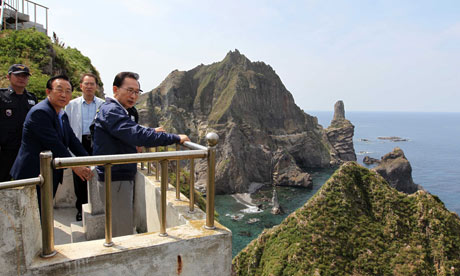
Lee, who will step down as president later this year, ignored calls from Japanese leaders to cancel the trip to one of the islands that make up the Takeshima chain, known as Dokdo among Koreans.
After arriving by helicopter from the nearby island of Ulleungdo, Lee said that South Korea "must continue to protect its territory". He left the island later in the afternoon and was due to speak to reporters on his return to Seoul.
Lee's visit drew an angry response from Japan, which insists the islands, which lie roughly equidistant between the two countries in the Japan Sea – or the East Sea according to Koreans – are an integral part of its territory. In Tokyo, the government's chief spokesman, Osamu Fujimura, described Lee's visit as "extremely regrettable". Later, the government said it was ordering its ambassador in Seoul, Masatoshi Muto, to return to Tokyo to discuss the dispute.
Japan's foreign minister, Koichiro Gemba, said the visit would have a big impact on bilateral ties, but did not specify what, if any, countermeasures were being considered.
Officials in Seoul said Lee's visit was not designed to provoke Japan, with which South Korea enjoys close tourism and economic ties, albeit against a backdrop of resentment over Japan's 1910-1945 colonial rule of the Korean peninsula. An unnamed official said the trip was intended only to highlight the island's importance as a natural reserve. "There shouldn't be anything unusual in a national leader visiting a place that is our territory," the official told Reuters.
A freshwater lagoon helps sustain about 80 species of plants, and dozens of birds and insects. The meeting of cold and warm water currents has led to a profusion of fish and other marine life. The islands sit amid rich fishing grounds and, according to some reports, near frozen natural gas deposits that could be worth billions of dollars.
A coastguard garrison has been stationed on Takeshima since 1954, and their only known civilian residents are Kim Seong-do, an elderly fisherman, and his wife, Shin-yeol.
Lee's visit comes soon after Japan renewed its claim over Takeshima in its annual defence paper, and days before South Korea marks the anniversary of its liberation from Japanese rule at the end of the second world war.
Some interpreted the move as an attempt by Lee to appeal to nationalist sentiment in the south and improve the chances of his party's candidate, Park Geun-hye, in December's presidential election. South Korea's constitution bans sitting presidents from seeking a second term.
Lee's ruling New Frontier party said Lee had demonstrated South Korea's "determination to protect our territory". But the main opposition Democratic United party said Lee should have used his final months in office to resolve longstanding disagreements over Japan's sexual enslavement of Korean women before and during the war, and the use of school textbooks glorifying Japanese militarism.
The visit has also raised the stakes at the Olympics, where Japan and South Korea are due to play for the bronze medal in the men's football tournament in Cardiff on Friday.
The Takeshima islands, comprising two small islands and more than 90 rocks and reefs, were made part of Japan's Shimane prefecture in 1905. The countries' competing claims are mired in historical ambiguity, and complicated by several name changes and cartographical evidence from myriad Korean, Japanese and western sources stretching back centuries.
In 2010, South Korea's media reported the discovery of a 1949 US military map that, according to the Chosun Ilbo newspaper, "clearly states that Dokdo belongs to Korea".-The Guardian (August 10, 2012)

No comments:
Post a Comment